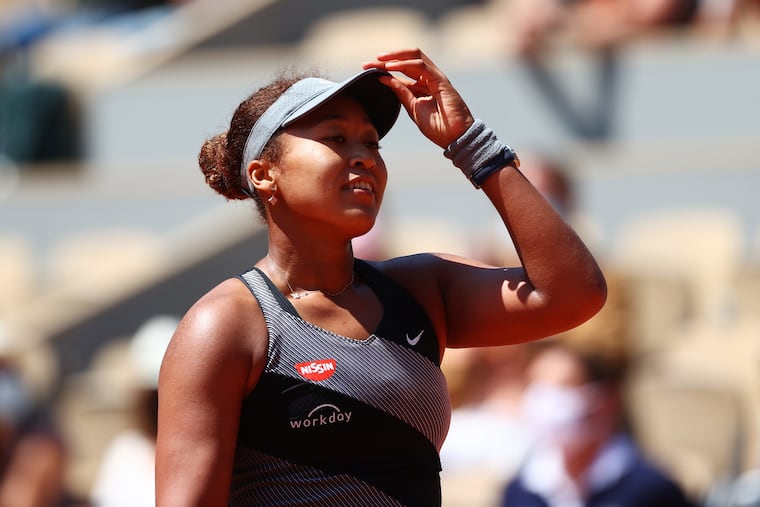Philly-area therapists explain why Naomi Osaka’s actions are significant for young women of color
'We need to understand that sometimes we need to do the hard things, and sometimes that is saying no.'

Naomi Osaka pulled out of the French Open on Monday, citing concerns about her mental health after a dispute with officials about participating in post-match news conferences. As the highest-paid female athlete in the world, she immediately reignited a conversation about depression and anxiety in sports, as well as the importance of setting boundaries in professional settings.
For therapists who work with young women of color in Pennsylvania, Osaka’s decision made them proud.
“What a way to stand up for yourself,” said Amy Walker, a sports psychologist based in Harrisburg. “This forces organizations to pay more attention to athletes’ mental health and calls for more work. It’s making people more aware of what’s going on.”
Walker, who often works with college athletes struggling with depression or anxiety, said that news conferences with cameras and people sitting on the other side of the table can be extremely hard for those with social anxiety, “even if you do not say anything, like Marshawn Lynch,” she said of the NFL star who was just nominated to the College Football Hall of Fame on Wednesday.
“Naomi basically said, ‘There is no amount of money that is worth my peace of mind and mental health,’” Walker said. “What she did — withdraw — is one of the suggestions I would give to anyone in terms of setting a boundary. Sometimes you have to disengage completely, and she was pushed to that limit.”
Until this week, Osaka has never spoken publicly about her struggles with depression, which she said started after the 2018 U.S. Open, where Osaka was booed after her win against Serena Williams.
Now, Osaka has joined a group of noteworthy professional athletes who have shared their mental health struggles in the last few years, including Olympians Michael Phelps, who has spoken about depression and suicidal thoughts, and Aly Raisman, who has talked about dealing with post-traumatic stress disorder (PTSD) from convicted sex offender Larry Nassar’s abuse. In 2019, Eagles player Brandon Brooks shared his battle with anxiety after it caused him to miss a few games. Already, a number of athletes have shown their support for Osaka, including Serena Williams and Brooklyn Nets player Kyrie Irving.
Osaka’s actions are particularly significant for young women of color, said Jaynay Johnson, who founded Teen Talk Therapy for adolescents in the Philadelphia area.
“We need to understand that sometimes we need to do the hard things, and sometimes that is saying no,” Johnson said. “We can push back. We can decide to center ourselves. This is not something a lot of women of color have had the opportunity to do. We often feel, ‘We have to do this, we have to do that,’ at the expense of our well-being.”
» READ MORE: Naomi Osaka did what many women of color have to do: Choose themselves, at a cost | Helen Ubiñas
Osaka’s actions can give other young women the bravery to set boundaries, even if it’s not on as large a scale, Johnson said. She said she was glad to see Osaka “get off the hamster wheel” instead of seeing it through.
Setting boundaries is about keeping yourself safe, even when it’s not comfortable, said Walker. Oftentimes, people think that setting boundaries should come after something goes wrong, but instead it should be considered a preventive measure, she said.
“Many times people will not offer that permission to set a boundary to themselves because they are more concerned about people on the other side of the boundary,” Walker said. “But you have to give yourself that permission.”
Sometimes saying no in a respectful tone — such as “I can’t do that right now” — is what’s required, she said.
Johnson hopes Osaka’s actions will spur tennis organizations to improve how they deal with players’ mental health issues.
“What we witnessed was a disconnect between advocacy and application,” Johnson said. “So many of us are talking about it. But we have to stop and do something different when we fall short as a society, even if it can be uncomfortable to change policies and rules. Maybe we need to change the system. We’re finally getting to that point of bridging how a societal fault directly impacts mental health.”